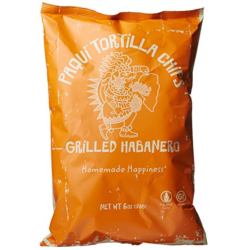 The maker of Paqui-brand tortilla chips has been hit with a class action lawsuit over its use of the term “evaporated cane juice” as an ingredient because ECJ is “sugar in disguise.”
The maker of Paqui-brand tortilla chips has been hit with a class action lawsuit over its use of the term “evaporated cane juice” as an ingredient because ECJ is “sugar in disguise.”
In the Paqui tortilla chips class action lawsuit, plaintiff Dominique Morrison points to guidance issued last year by the U.S. Food and Drug Administration that the term “evaporated cane juice” is misleading because it suggests to consumers that the sweetener is made from “juice” when the actual characterizing properties of the ingredient are those of sugar.
“The term ‘evaporated cane juice’ is not the common or usual name for any type of sweetener,” the FDA found before concluding that ECJ “should instead be declared on food labels as ‘sugar,’” according to the Paqui chips class action lawsuit.
By listing “evaporated cane juice” instead of “sugar” as an ingredient, Amplify Snack Brands Inc. misleads consumers into believing its Paqui tortilla chips products contain less sugar than they actually have and/or that the products don’t contain added sugar, the Paqui chips class action lawsuit alleges.
Morrison, a resident of St. Louis, claims she purchased Paqui-brand Roasted Jalapeno Tortilla Chips and Grilled Habanero Tortilla Chips after reviewing the products’ labels. She says she paid $3.29 for each bag of chips.
Amplify knows that many consumers are interested in purchasing products that do not contain added sugar, the Paqui tortilla chips class action lawsuit alleges. By using the term “evaporated cane juice” instead of “sugar” on the product label, Amplify entices consumers to purchase the products under the false belief that they contain less sugar than they really contain or that they have no added sugar, Morrison claims.
Morrison alleges that no reasonable consumer would know by looking at a product label that the ingredient “evaporated cane juice” is actually sugar.
According to the Paqui chips class action lawsuit, Morrison either would have paid less for the Paqui tortilla chips or would not have purchased them at all if she had known they contained sugar disguised as evaporated cane juice.
The evaporated cane juice class action lawsuit asserts claims for unjust enrichment and violations of Missouri’s Merchandising Practices Act, which prohibits companies from using deception, fraud or misrepresentation about any material fact in connection with the advertisement or sale of any product.
By filing the Paqui tortilla chips class action lawsuit, Morrison seeks to represent a Class of all Missouri citizens who purchased Paqui Roasted Jalapeno Tortilla Chips and/or Paqui Grilled Habanero Tortilla Chips for personal use within the past five years. She seeks compensatory damages, declaratory and equitable relief, pre- and post-judgment interest, attorneys’ fees and costs, and other relief deemed proper by the court.
Morrison is represented by Matthew H. Armstrong of Armstrong Law Firm LLC and Stuart L. Cochran of Steckler Gresham Cochran PLLC.
The Paqui Chips Evaporated Cane Juice Class Action Lawsuit is Dominique Morrison v. Amplify Snack Brands Inc., Case No. 4:17-cv-00816-RWS, in the U.S. District Court for the Eastern District of Missouri.
ATTORNEY ADVERTISING
Top Class Actions is a Proud Member of the American Bar Association
LEGAL INFORMATION IS NOT LEGAL ADVICE
Top Class Actions Legal Statement
©2008 – 2026 Top Class Actions® LLC
Various Trademarks held by their respective owners
This website is not intended for viewing or usage by European Union citizens.















One thought on Paqui Chips Class Action Calls ‘Evaporated Cane Juice’ Label Misleading